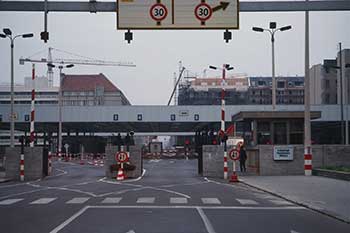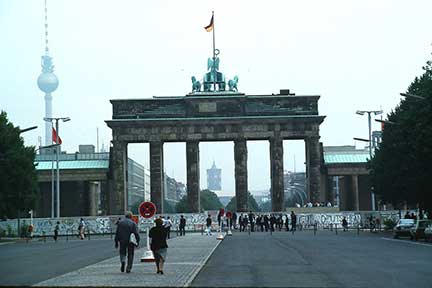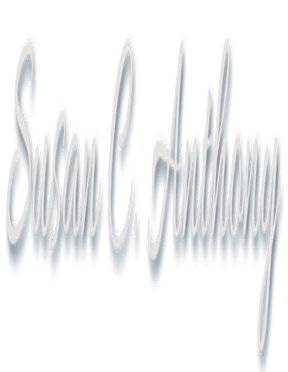 Berlin
Berlin
September 17 - 18, 1987
We had a difficult time deciding where to go after we left the Netherlands. We thought about Denmark and Sweden, but it was getting late in the fall and we didn't know how much the ferries would cost. I was shy of borders after the Dutch policeman warned us we might have trouble with the paperwork on the car, so I preferred to go through as few borders as possible.
Dennis had missed seeing Berlin during his first trip to Europe in 1961, and didn't want to miss it again. I didn't want to take the car into East Germany. We compromised and took a train.
We got to the train station at 12:10, and the only train that day left at 1:00. We had less than an hour to select what we needed for three days, lock everything else into a locker or the car, park the car in a safe and legal place, buy tickets and board the train.
We did it, but in the rush forgot two very important items—our German phrasebook and Let's Go Europe, our travel guidebook.
The other passengers in the train compartment were quite friendly and interested in us, but spoke no English. Thank goodness, I had studied the phrasebook and knew a few key words and phrases. I was amazed at how much even that helped in communication. I began asking the names of things, writing them down, and studying. One woman in particular was very pleased with my attempt, and was an enthusiastic teacher.
Of course, words are only one form of communication. An elderly couple in the compartment carried East German passports. They had been visiting family in West Germany and were returning home. As we passed the border, with watchtowers and an electric fence with posts that automatically shoot anyone trying to escape, the old woman's eyes filled with tears.
We camped in West Berlin, and sat down next to a canal near the campground to have a drink. I saw something big move on the bridge nearby.
"Dennis, look, it's a RAT!" I screamed, getting up quickly from my seat on the ground. Indeed it was, the first rat I'd ever seen and the largest we were to see on our trip. We went over to where it had moved down out of the light on the side of the road and watched it for awhile. I felt glad to live in Anchorage, the only rat-free port city in the world!
 The next morning early we set out for Checkpoint Charlie and a visit to East Berlin. We went through several formalities at the border, through passport checks, several sets of locked doors, currency declaration forms, compulsory money exchange of 25 marks each, and customs. I got through easily and fairly quickly, but waited outside a long, long time for Dennis.
The next morning early we set out for Checkpoint Charlie and a visit to East Berlin. We went through several formalities at the border, through passport checks, several sets of locked doors, currency declaration forms, compulsory money exchange of 25 marks each, and customs. I got through easily and fairly quickly, but waited outside a long, long time for Dennis.
A customs official had opened the main compartment of his pack and found a few pages of a Dutch newspaper in the bottom. She asked why he was carrying it. He explained that it was to catch crumbs and spills in the pack. She accepted the explanation and he asked her if she wanted to look in the front pocket of the pack.
"I'LL ask the questions," she answered testily. "I'LL tell you what I want to see!"
Once through the border, we walked through an area of gray apartment buildings, some riddled with bullets, into the central city. We had expected everything to be gray, dreary, and a bit depressing, but that was not the case at all. The part of East Berlin we visited was without doubt the best-kept urban area we saw in Europe, with beautiful flower-filled parks, fountains, museums and churches. Most of the war damage had been repaired. We saw no piles of garbage or litter, no seedy characters or red-light districts as were characteristic of Western European cities we visited.
East Berlin was clean and refreshing. There was obviously someone in charge, and that didn't seem entirely bad. As a teacher, I weary of constant challenges to authority on the most trivial matters, and the endless hassles in enforcing even minimal discipline in the classroom when students and parents do not voluntarily cooperate. No problem with that here. And no worries about theft or crime.
 Dennis and I discussed the difference we saw between East and West during the day. The East German cars were small and old. They looked to have been mass-produced in a gray Soviet factory. Despite the fact that we were required to exchange hard currency for Ostmarks at an official rate nearly four times the black market rate, we found things quite cheap. We ate tasty herring sandwiches for the equivalent of $.25 each, bought a camp chair for $7.00 and purchased groceries in a large, well-stocked supermarket. Dennis took a picture of people lined up on a sidewalk to get into a bookstore!
Dennis and I discussed the difference we saw between East and West during the day. The East German cars were small and old. They looked to have been mass-produced in a gray Soviet factory. Despite the fact that we were required to exchange hard currency for Ostmarks at an official rate nearly four times the black market rate, we found things quite cheap. We ate tasty herring sandwiches for the equivalent of $.25 each, bought a camp chair for $7.00 and purchased groceries in a large, well-stocked supermarket. Dennis took a picture of people lined up on a sidewalk to get into a bookstore!
The only printed material we found in English was East German propaganda, much of it anti-U.S. It made for interesting reading, and presented a case for the "other" side of the story. For one thing, they were proud of doing much better than the West as far as recycling aluminum, glass, and paper.
Despite generally favorable impressions, something didn't "feel" right. We could never forget that the inhabitants could not travel freely like we could. They would be killed if they tried to leave. That's a big price to pay for social order.
The sun set and we walked back toward Checkpoint Charlie, past the war memorial, the river reflecting glittering city lights, and the concert hall. Through an archway, we saw a beautiful lighted fountain. We approached it and we were stopped by a well-dressed old gentleman who asked us a question in German.
"Sprechen Sie Englisch?" asked Dennis.
"Yes," answered the man. "Could you tell me the time?"
Dennis did so, and the man began a conversation. He knew much more about Alaska than we did about Germany. He had learned English through self study, and was a lecturer at the University.
He asked how we liked East Berlin. When we answered that it was much different than we had expected and we were favorably impressed, he exclaimed vehemently, "Impression! That's exactly what they want to do, create a good impression. It is false!" He seemed bursting to talk, and we listened, spellbound, to his stories about life in East Germany. He was more than 70 years old, and had been a scholar and a teacher since before the war. He served in the German army only a short time before being captured and held as a prisoner of war. He had read and studied extensively at the very library the lighted fountain graced, and had seen its great collections censored and destroyed. Government control, he said, had grown more and more strict over the past 20 years, and now every teacher was required to profess Marxism. "I am no Marxist!" he said.
Despite our concern that a policeman or other official might walk by, we listened, fascinated to hear his candid opinions. He talked with us for over an hour, but finally we had to leave. For us, passing through the border to West Berlin was no problem. For him, it would be difficult or impossible. (He told us that retired people, such as the couple we met on the train, are allowed to travel, and are even allowed to move away. This is because they are no longer productive and the State would rather not pay for their keep.)
On the underground train back to the campground, a punk rocker with wild hair and dirty clothes sat down across from us. Hiding in one of his sleeves was a live rat. Individual freedom and expression, I suppose.
The following day we walked around outside the Berlin Wall and visited the Checkpoint Charlie Museum, which is filled with political details about oppression and the Wall. It contains pictures and accounts of hair-raising escapes.
 The sense of separation between East and West Berlin was most apparent at Brandenburg Tor, where the wall runs right across one of Berlin's main boulevards. There we saw a well-dressed group of college-age visitors laughing and throwing rocks over the wall at the East German patrols.
The sense of separation between East and West Berlin was most apparent at Brandenburg Tor, where the wall runs right across one of Berlin's main boulevards. There we saw a well-dressed group of college-age visitors laughing and throwing rocks over the wall at the East German patrols.
It didn't seem to be a situation that could continue indefinitely. I shuddered to think what might lie ahead.
P.S. The subject of Communism came up in a 4th grade class I taught in 1989, so I pulled out my slides of East Berlin to share with the students. They were fascinated! When news broke soon afterward about "a crack in the Berlin Wall", they began arriving at school with notes they'd taken during the previous evening's news. What an amazing group of kids! They could carry on productive discussions that lasted for hours and ranged through the curriculum. They were full of questions and eager to learn. They began to wonder whether I was clairvoyant when we studied earthquakes and volcanoes, only to have a real earthquake strike California and a real volcano erupt, visible from our classroom window!
A friend of ours who escaped from Communist Czechoslovakia wrote a book about his experience. It helped me to appreciate America, as well as to better understand what life was like for people living behind the Iron Curtain. I recommend that everyone read George Statsny's book Risk for Freedom.
Go on to Llechweld Slate Caverns
Source: www.SusanCAnthony.com, ©Susan C. Anthony
